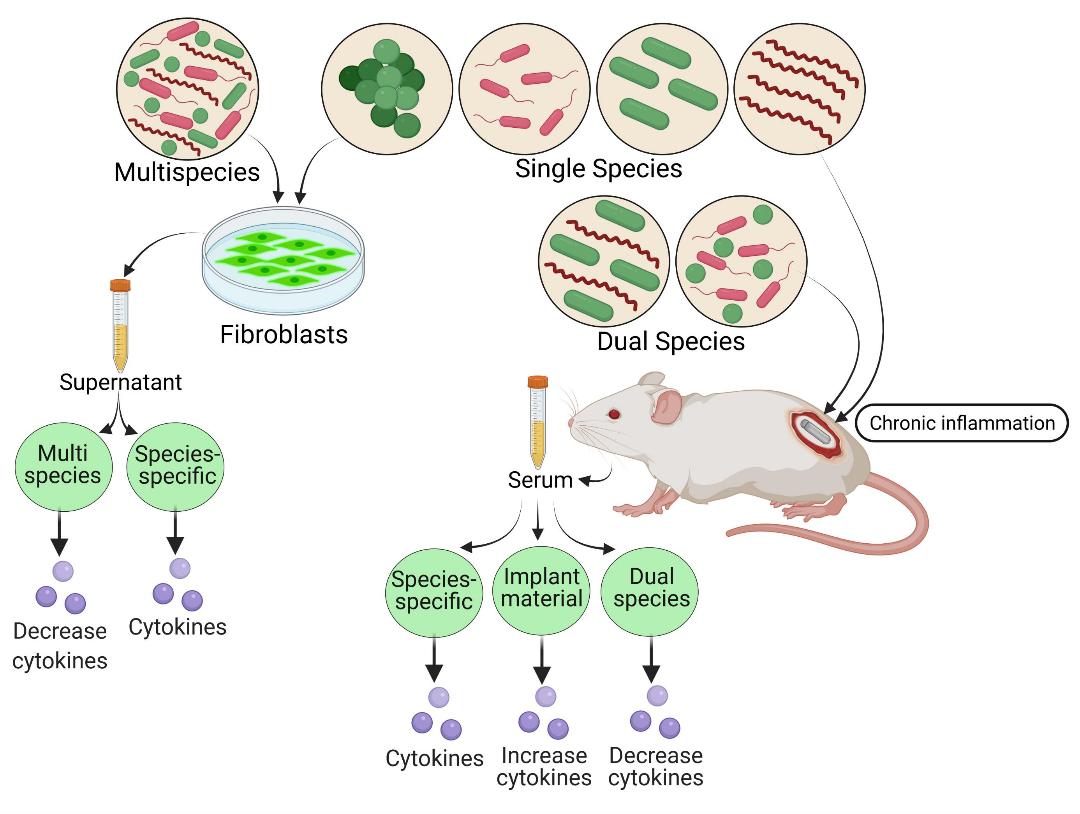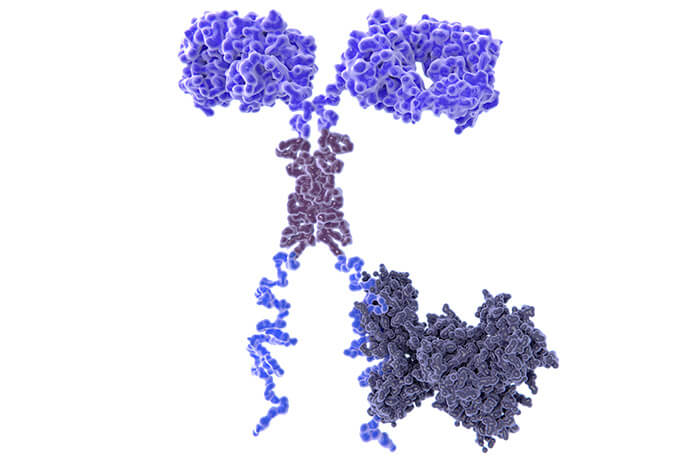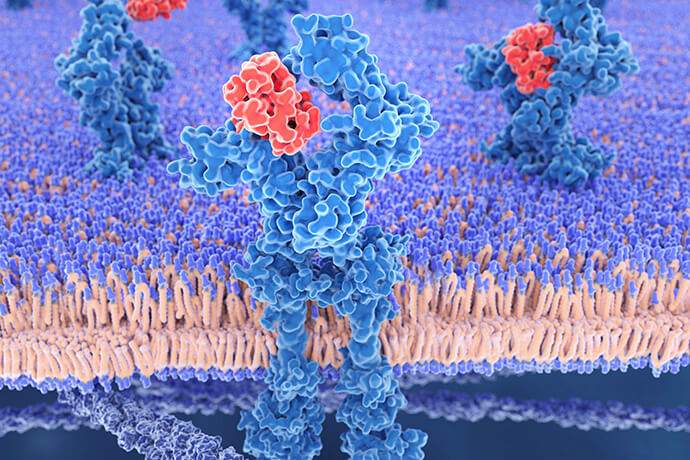Cytokines, often referred to as "immunomodulators," are small proteins produced by various immune cells and are essential in orchestrating the immune response. When it comes to the murine world, mouse cytokines serve as the conductors of the immune symphony. These signaling molecules are instrumental in shaping the immune landscape, regulating inflammation, and influencing immune cell behavior.
Mouse cytokines are of paramount importance in understanding immune responses, not just in mice but also in extrapolating valuable insights into human immunology. Their evolutionary conservation and similarities to human cytokines make them invaluable tools in disease research.
Types of Mouse Cytokines
Cytokines are a diverse group of signaling proteins that play pivotal roles in regulating immune responses, inflammation, and various physiological processes in mice. Understanding the different types of mouse cytokines is essential for unraveling their complex functions. Mouse cytokines can be broadly categorized into pro-inflammatory cytokines, anti-inflammatory cytokines, and other important signaling molecules.
Pro-Inflammatory Cytokines
Pro-inflammatory cytokines are typically produced during the early stages of an immune response and are responsible for promoting inflammation, recruiting immune cells to the site of infection or injury, and enhancing the body's defense mechanisms.
Interleukin-1β (IL-1β): IL-1β is a potent pro-inflammatory cytokine that stimulates fever, vascular permeability, and the production of other cytokines. It plays a central role in initiating the inflammatory response.
Interleukin-6 (IL-6): IL-6 is a multifunctional cytokine involved in acute-phase responses, B cell activation, and the differentiation of T cells. It is critical for the regulation of inflammation and immune responses.
Tumor Necrosis Factor-Alpha (TNF-α): TNF-α is a key cytokine involved in inflammation, apoptosis (cell death), and the regulation of immune cells. Excessive TNF-α production is associated with chronic inflammatory conditions.
Select Service
Anti-Inflammatory Cytokines
Anti-inflammatory cytokines counterbalance the pro-inflammatory response by dampening inflammation and promoting tissue repair and immune regulation. They are crucial for preventing excessive immune reactions.
Interleukin-10 (IL-10): IL-10 is a potent anti-inflammatory cytokine that suppresses the activation and function of various immune cells, including macrophages and T cells. It helps maintain immune homeostasis.
Transforming Growth Factor-Beta (TGF-β): TGF-β plays a dual role, as it can have both pro-inflammatory and anti-inflammatory effects depending on the context. It regulates cell growth, differentiation, and immune tolerance.
 Inflammatory Cytokines in a Mouse Model (Rahim et al., 2022)
Inflammatory Cytokines in a Mouse Model (Rahim et al., 2022)
Other Important Cytokines
In addition to pro-inflammatory and anti-inflammatory cytokines, there are several other cytokines with distinct functions in immune regulation and tissue homeostasis:
Interferons (IFNs): Interferons are crucial for antiviral defense and immune modulation. They include type I IFNs (IFN-α and IFN-β) and type II IFN (IFN-γ), each with unique roles in immune responses.
Chemokines: Chemokines are a family of cytokines that play a crucial role in guiding immune cells to sites of infection or injury. They are responsible for cell chemotaxis and trafficking.
Understanding the balance and interplay between these various types of mouse cytokines is essential for comprehending the regulation of immune responses, inflammation, and the development of diseases. Dysregulation of cytokines can lead to chronic inflammatory conditions, autoimmune diseases, or immune deficiencies, making the study of mouse cytokines a fundamental aspect of immunology research.
The Role of Mouse Cytokines in Immune Response
Mouse cytokines are integral to the orchestration of immune responses, acting as molecular messengers that coordinate the actions of immune cells. Their functions are crucial in both innate and adaptive immunity, helping the immune system effectively detect, respond to, and eliminate pathogens or abnormal cells.
Cytokines in Innate Immunity
Innate immunity serves as the first line of defense against invading pathogens, and mouse cytokines play several key roles in this process:
Macrophage Activation: Cytokines like interleukin-1β (IL-1β) and tumor necrosis factor-alpha (TNF-α) activate macrophages, which are phagocytic immune cells. These activated macrophages engulf and digest pathogens, producing additional cytokines to amplify the immune response.
Natural Killer (NK) Cell Function: Interferon-gamma (IFN-γ), a cytokine produced by various immune cells, including T cells and NK cells, enhances the cytotoxic activity of NK cells. NK cells can identify and destroy infected or cancerous cells through cytokine-mediated signaling.
Cytokines in Adaptive Immunity
Adaptive immunity provides specific and long-lasting protection against pathogens, and mouse cytokines are pivotal in shaping adaptive immune responses:
T Cell Differentiation and Activation: Cytokines are instrumental in directing the differentiation of naïve T cells into effector T cell subsets. For instance, IL-12 drives the differentiation of naïve T cells into Th1 cells, which are essential for cellular immunity against intracellular pathogens. In contrast, IL-4 promotes the differentiation of Th2 cells, which are involved in antibody-mediated immune responses.
B Cell Activation and Antibody Production: Cytokines such as IL-4 and IL-21 stimulate B cells to produce antibodies (immunoglobulins). This process is critical for humoral immunity, where antibodies neutralize pathogens, facilitating their clearance.
Cytokine-Mediated Communication Between Immune Cells: Cytokines serve as messengers between different immune cell types, enabling effective collaboration. For example, dendritic cells produce IL-12, which stimulates T cells to release IFN-γ, further activating macrophages and enhancing the immune response.
Role in Immune Memory
Cytokines also contribute to the development of immune memory, a hallmark of adaptive immunity. Memory T and B cells, which provide rapid and robust responses upon re-exposure to a pathogen, are influenced by cytokines during their formation and maintenance.
Understanding the specific roles of mouse cytokines in both innate and adaptive immunity is essential for deciphering how the immune system recognizes and responds to various threats. Dysregulation or imbalance of cytokines can lead to immune-related disorders, emphasizing the significance of studying mouse cytokines in immunology research. This knowledge not only advances our understanding of basic immunology but also has implications for the development of vaccines, immunotherapies, and treatments for immune-mediated diseases.
The Crucial Role of Mouse Cytokine in Disease Research
Mouse cytokines serve as a beacon of hope in the often-complex landscape of disease research. Their relevance extends to a plethora of diseases, including cancer, autoimmune disorders, and infectious diseases. Understanding the intricate web of cytokine signaling pathways in mouse models offers researchers a unique opportunity to decipher the underlying mechanisms of these diseases.
In cancer research, for example, mouse cytokines are indispensable in elucidating how the immune system recognizes and targets cancer cells. By studying the interplay of cytokines within the tumor microenvironment, researchers can identify potential therapeutic targets and develop immunotherapies.
Autoimmune disorders, characterized by aberrant immune responses against the body's own tissues, pose a significant medical challenge. Mouse cytokines play a pivotal role in unraveling the immunological intricacies of autoimmune diseases, paving the way for the development of targeted therapies that restore immune balance.
In the context of infectious diseases, mouse cytokines offer a unique window into host-pathogen interactions. Researchers can mimic human infections in mouse models and study the cytokine responses, shedding light on the immune strategies employed by pathogens and informing the development of vaccines and antiviral therapies.
Translational Research
Translational research in the realm of mouse cytokine studies represents a pivotal link between laboratory findings and their broader application in the scientific and biomedical fields. Translational research efforts in mouse cytokine studies have profound implications, particularly in the realm of immunology and our comprehension of various diseases. The insights gained from well-designed experiments using mouse models can catalyze innovative approaches with the potential for broader scientific applications.
Targeted Therapies: Understanding the roles of specific cytokines in mouse models can inform the development of targeted therapies. For instance, if a particular cytokine is found to be overexpressed in a mouse model of autoimmune disease, this knowledge can guide the development of drugs that selectively modulate that cytokine, potentially offering more precise and effective treatments.
Immunotherapy Advancements: Mouse cytokine research has played a pivotal role in advancing immunotherapy approaches. By studying how cytokines influence the tumor microenvironment in mice, researchers can develop immunotherapies that enhance the body's immune response against cancer. These therapies, after successful preclinical validation in mouse studies, can proceed to clinical trials with the hope of revolutionizing cancer treatment.
Diagnostics and Biomarkers: Translational research extends to diagnostics as well. Insights gained from mouse models can lead to the identification of specific cytokine biomarkers associated with disease progression. These biomarkers, if further validated, could find utility in early disease detection and assessment of treatment responses.
Mouse Models for Cytokine Research
Mouse models are invaluable tools in cytokine research, allowing scientists to investigate the functions, regulation, and impact of specific cytokines in vivo. These models involve genetically modified mice, including knockout mice and transgenic mice, as well as other strategies to manipulate cytokine expression and study their effects.
Use of Genetically Modified Mice
Knockout Mice: Knockout mice are engineered to have specific cytokine genes deleted or "knocked out." This genetic manipulation results in mice that lack the ability to produce the targeted cytokine. Researchers use knockout mice to investigate the role of a particular cytokine by observing how its absence affects immune responses and overall health. For example, IL-10 knockout mice exhibit increased susceptibility to inflammatory diseases, highlighting the anti-inflammatory role of IL-10.
Transgenic Mice: Transgenic mice are created by introducing additional copies of cytokine genes into their genome. These mice overexpress the cytokine of interest. Transgenic models are useful for studying the consequences of elevated cytokine levels and their potential roles in disease. For instance, mice overexpressing IL-6 may exhibit chronic inflammation and autoimmune-like symptoms.
Advantages and Limitations of Mouse Models
Advantages:
Genetic Control: Mouse models allow precise control over cytokine expression and genetic background, providing consistency in experiments.
Reproducibility: Results from mouse studies are often highly reproducible, enhancing the reliability of findings.
Phenotypic Analysis: Researchers can perform detailed phenotypic analyses, including histological, immunological, and molecular assessments.
Cost-Effectiveness: Maintaining and breeding mouse colonies is generally cost-effective compared to larger animal models.
Limitations:
Species Differences: Mouse models do not perfectly replicate human physiology, and there can be significant species-specific differences in cytokine function.
Complexity: Cytokine networks are complex, and isolating the effects of a single cytokine can be challenging.
Ethical Considerations: Ethical concerns regarding animal welfare and the use of genetically modified animals must be addressed.
Examples of Cytokine-Related Mouse Models
IL-12 and IFN-γ Knockout Mice: These mouse models are crucial for studying immune responses and how cytokines like IL-12 and IFN-γ help defend against intracellular infections. They also help us understand how cytokine imbalances relate to autoimmune diseases.
IL-4 Transgenic Mice: These mice, with increased IL-4 levels, help researchers investigate its role in allergies, asthma, and immune reactions led by Th2 cells.
IL-10 Knockout Mice: These mice are essential in understanding how IL-10 prevents excessive inflammation and autoimmunity, revealing its anti-inflammatory properties.
TNF-α Transgenic Mice: Transgenic mice with elevated TNF-α levels are valuable for exploring the cytokine's involvement in chronic inflammatory conditions, such as rheumatoid arthritis.
Mouse Models of Cytokine Receptor Mutations: Scientists use mice with mutated cytokine receptors, like the IL-2 receptor, to study how receptor dysfunction can cause immunodeficiency disorders.
Cytokine Profiling in Mouse Models
Cytokine profiling in mouse models represents a powerful approach to unravel the intricate mechanisms underlying immune responses and disease pathogenesis. Among the various techniques available for cytokine analysis, the Luminex mouse panel stands out as a robust and comprehensive tool for simultaneously assessing multiple cytokines and chemokines.
The Luminex mouse panel is a sophisticated technology designed to streamline cytokine analysis in mouse models. This panel offers several key advantages that make it an indispensable tool for researchers investigating cytokine responses in vivo.
Multiplex Capability: Perhaps the most notable feature of the Luminex mouse panel is its ability to simultaneously quantify multiple cytokines and chemokines from a single sample. This multiplexing capability not only saves valuable samples but also provides a comprehensive snapshot of the immune milieu within a given biological specimen.
Extensive cytokine coverage: The Luminex mouse panel encompasses a broad range of cytokines, covering key players such as interleukins, interferons, tumor necrosis factors, and more. This extensive coverage allows researchers to explore a diverse array of immune responses within the same assay, fostering a holistic understanding of cytokine dynamics.
Sensitivity and precision: Luminex technology is renowned for its high sensitivity, enabling the detection of cytokines at low concentrations. This precision is critical when studying subtle changes in cytokine profiles that may have significant implications for disease progression or therapeutic interventions.
Reference:
- Rahim, Muhammad Imran, et al. "Bacterial-specific induction of inflammatory cytokines significantly decreases upon dual species infections of implant materials with periodontal pathogens in a mouse model." Biomedicines 10.2 (2022): 286.



